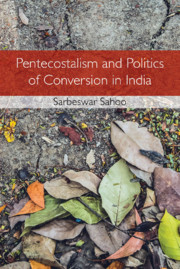Book contents
- Frontmatter
- Contents
- Foreword
- Preface
- Abbreviations
- 1 Introduction: Conversion and the Shifting Discourse of Violence
- 2 Spreading Like Fire: The Growth of Pentecostalism among Tribals
- 3 Taking Refuge in Christ: Four Narratives on Religious Conversion
- 4 Becoming Believers: Adivasi Women and the Pentecostal Church
- 5 Seen as the Alien: Hindutva Politics and Anti-Christian Violence
- 6 Conclusion: Beyond the Competing Projects of Conversion
- Endnotes
- Bibliography
- Index
1 - Introduction: Conversion and the Shifting Discourse of Violence
Published online by Cambridge University Press: 05 April 2018
- Frontmatter
- Contents
- Foreword
- Preface
- Abbreviations
- 1 Introduction: Conversion and the Shifting Discourse of Violence
- 2 Spreading Like Fire: The Growth of Pentecostalism among Tribals
- 3 Taking Refuge in Christ: Four Narratives on Religious Conversion
- 4 Becoming Believers: Adivasi Women and the Pentecostal Church
- 5 Seen as the Alien: Hindutva Politics and Anti-Christian Violence
- 6 Conclusion: Beyond the Competing Projects of Conversion
- Endnotes
- Bibliography
- Index
Summary
Introduction and the argument
This book is about the politics of Pentecostal conversion and anti- Christian violence in India. According to Lata Mani (2009: 125), violence refers to ‘any diminishment or violation of isness. Isness is the quality of beingness that is intrinsic to all that is alive’. For Mani, ‘isness embraces form as well as essence, surface as well as depth, matter as well as spirit. All living things whether deemed animate like humans and animals, or regarded as inanimate like stones or rocks, manifest their own specific isness’. Mani further notes that ‘violence whether upon oneself or another signals the dishonouring of isness’. For her, ‘violence can be physical, mental, emotional or some combination of all three. Depending on context, both action and inaction can be forms of violence’ (Mani, 2009: 125). Although Mani's definition of violence is very significant, it is articulated at a philosophical level; it is broad in scope and can describe practically anything as violence. Furthermore, the concepts of ‘isness’ and ‘beingness’ are very abstract.
In this book, the concept of violence is used in two senses: physical violence and intersubjective violence (Howes, 2008: 3). Physical violence is ‘violence associated with our physical capacities and limitations’, expressed primarily through physical attacks, riots, beating, killing, murder, rape, torture, brutality, prosecution, force, aggression, cruelty, and so on. Such violence is ‘understood as a means for changing the nature of our social relations, but its distinctive quality lies in its close association with the manipulation and destruction of the body’ (Howes, 2008: 3). Intersubjective violence refers to ‘violence associated with profound fissures in our expectations as to how we ought to interact with one another’. Particularly, ‘this intersubjective violence can consist of a word, a gesture or a look either between individuals or as supported by institutions. Such violence can inspire fear, strike at the core of one's identity, or make a way of living and being impossible even without physical intimidation or destruction’ (Howes, 2008: 3).
Information
- Type
- Chapter
- Information
- Pentecostalism and Politics of Conversion in India , pp. 1 - 20Publisher: Cambridge University PressPrint publication year: 2018
